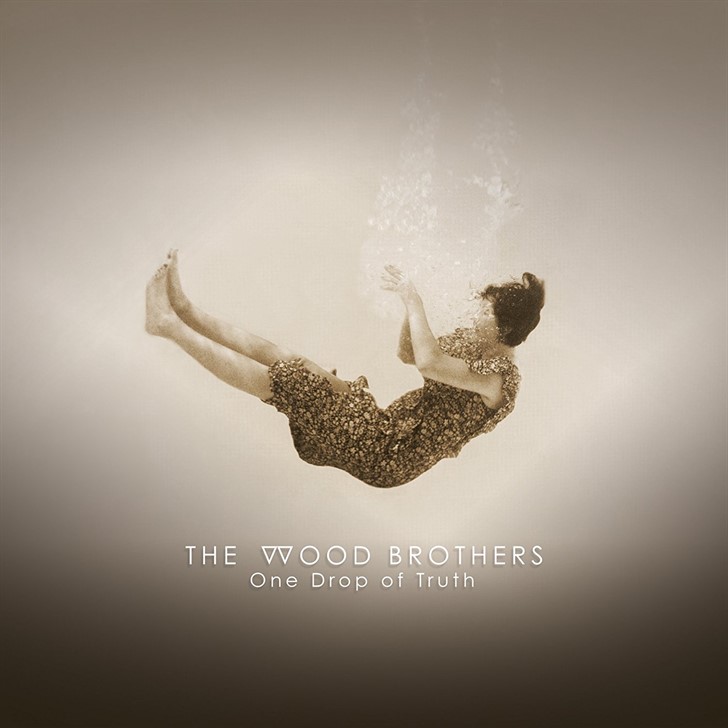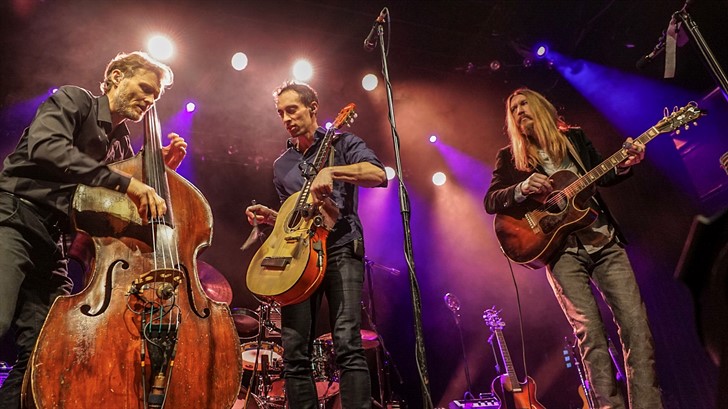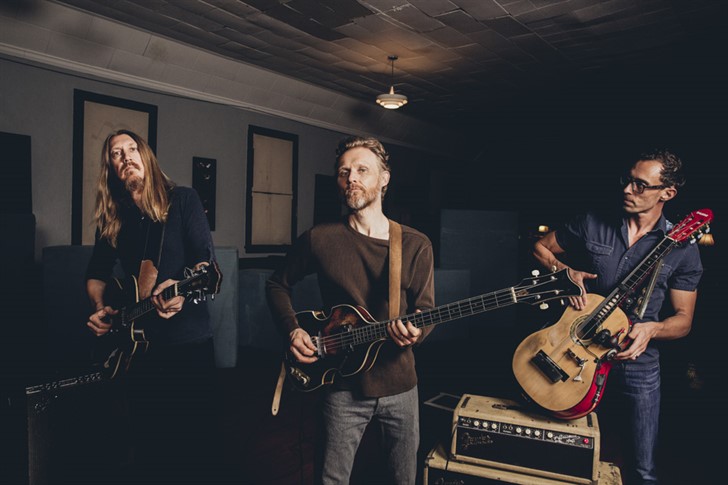Track By Track: The Wood Brothers _One Drop of Truth_
 Alysse Gafkjen
Alysse Gafkjen
“This is the most fun I’ve ever had recording,” Oliver Wood says of the sessions that led to The Wood Brothers’ new album, One Drop of Truth. The group’s prior albums were the product of regimented approaches
“What we did differently this time, and what we fantasized about doing for a long time, was spreading out a really loose process of writing and recording so that not everything happened at once,” Oliver continues. “We would write one or two songs and then we would go into the studio and record those two songs, and maybe even think of them as demos, but it was casual, fun and low-pressure. The idea was just to spread out the creation of the album over a full year. Another thing we did differently is we didn’t record all of it at one place. We used two different studios [in Nashville] that were very sonically different and had different vibes. It was fun to do it, and I’ve learned that’s a big thing—how much you enjoy the process.”
The Wood Brothers tapped a team of engineers to mix One Drop of Truth’s tracks, including Trina Shoemaker, Scotty Hard, Mike Poole and Brandon Belle. As for the musical goals that informed the sessions, Chris explains, “For us, it’s all about connecting people. We like to bring all those worlds together. That’s the beauty of the music. In the very beginning [2004], we weren’t a band yet; we were just two guys with different music careers. So we were wondering, ‘Where do we start? What do we do?’ The logical place to start was that Oliver had this band, King Johnson, that had written some great songs, but didn’t exist anymore, so we just rearranged some of those existing songs for a duo. Then, around the same time we wrote the first original Wood Brothers songs, we were already in a headspace where we could take an existing song and completely change the rhythmic feel, the key, all the different parts and even the melody and the form. It’s all up for grabs. That’s the freedom that I enjoyed with Medeski Martin & Wood, and I wanted to bring that into a singer-songwriter context.”

RIVER TAKES THE TOWN
OLIVER: “River Takes the Town” was originally inspired by a news story last winter about flooding in Louisiana. Ironically, the day that we were slated to record that song was the day after Houston was flooded by Hurricane Harvey. It was a little strange because the song wasn’t originally written about that, but it coincided with that. It’s a metaphorical song. I feel the whole song—and maybe a lot of songs on this album—reflects the fear of being disconnected that a lot of us have, whether it’s based on what goes on politically or natural disaster type of stuff. There’s all kinds of things that threaten people’s security when it comes to being connected, losing each other, losing communication or losing rights or whatever. That song touches on all those things without being about hardly any of them.
HAPPINESS JONES
CHRIS: This is a song about all of our jones for happiness, which is such a big part of our lives, with our gadgets, our clicks and our likes. But the real lessons happen on the days that we have to struggle through and when we hit bottom. A lot of this record addresses that you need the lows to appreciate the highs, or the lows are where you learn your lessons that help you get through life.
The groove was inspired by a live version of a Bill Withers song that Jano found on the internet and we just started grooving along with it. Sometimes what we’ll do when we’re rehearsing and just searching for a new rhythm or something is we’ll play a song that we love and imitate it. Then, we turn it off and we just keep playing to see where it develops and kind of make it our own. And that’s basically how we came up with the music for “Happiness Jones,” with the rhythmic feel. And from there, we just added the form of the actual song to it.
LAUGHIN’ OR CRYING
OLIVER: The first few lines in that song are inspired by just things I’ve heard people say. A couple people I know in my family—in my household—when they’re in certain moods, they may be laughing or they may be crying. It’s hard to tell. And sometimes they just go back and forth. So, that’s a literal thing.
This is one of these songs where it was fun to record it the way that we did; we played it one time in the studio as if it were a demo with just the three of us. Then we sat on it for a while and it was one of the songs on the album where, with the luxury of time, we just sort of let it gestate. Then we decided, we’ll take it from this studio and we’ll go finish it at the other studio, which sounds completely different. We gave it sort of more of a larger-room sound, added weird keyboards and background vocals, and sort of made it larger.
 Brian Stollery
Brian Stollery
STRANGE AS IT SEEMS
OLIVER: This song just came from a strange concept. I imagined a Tim Burton movie where there’s a guy who is lonely and he can’t find the right love of his life. He’s convinced he can do that in his dream, so he gets all dressed up and puts on his cologne and his suit and he goes to sleep, and then in the dream, he hopes to find his lover.
Oftentimes, these ideas originate with one theme. But then I also like the idea that one can interpret a song in different ways. So you could be a widow or a widower and meet your dead spouse in the dream, or your wife, who you’re having trouble relating with lately. The song is ambiguous enough and dreamy enough that you can sort of make your own scene or your own plot out of it.
SKY HIGH
CHRIS: Here, again, is the idea of the lows telling you about the highs, and making you appreciate the highs. This one came together at a soundcheck or a rehearsal. I had this little voice-memo recording of the groove and I had some lyrics around it, and they just married perfectly with this groove. So, this song was born out of that.
SEASICK EMOTIONS
CHRIS: This was written in the fall of 2016 during some hard times. There were the awful hurricanes and there was also the election. So there’s a lot of imagery in that one about hurricanes and seasick emotions—or just struggling and searching for clarity when you’ve had the rug pulled out from under you and the world just seems to have gone crazy. Musically, I think I’d written it o a little voice-memo seed—just some interesting little hook that I had recorded. So the lyrics and that music were kind of married together.
OLIVER: Another interesting fact about the song is that we recorded it not long after Hurricane Irma hit, and someone put online the sound they’d recorded from their porch in the Florida Keys when the hurricane went through. Then Trina Shoemaker, the woman who mixed that song, took a recording of that and made it fit. That sound is in the end of that song. There’s this weird sound and it’s really hard to recognize what the heck it is, but it’s the actual sound of a hurricane.
THIS IS IT
CHRIS: This is an anthemic song about trying to accept the world and who we are. Everyone’s trying so hard to be different or to change things and, ultimately, people just want to be liked or loved. So it’s a song about surrender and overthinking everything, and always wanting to be somewhere else than where you are. And, musically, the way this one came together was simple and organic. I had some lyrics on the page and then started playing the groove and singing. It was one of those very strange, spontaneous things that happened almost immediately.
SPARKLING WINE
OLIVER: Jano, our drummer and multitalented multi-instrumentalist, is also a great keyboard player. It’s hard to appreciate on an album, as opposed to a video or a live show, but on this song, he’s playing the keyboards and the drums at the same time. If that were a really simple thing or this were a really simple song, then maybe that wouldn’t be that impressive, but if you listen to it, it sounds like there’s two guys. It sounds like we have a keyboard player and we have a drummer. And he played that live, all the way through—drums and keyboards at the same time. The idea for him to play drums and keyboard at the same time is that a keyboard is also a percussion instrument.
Lyrically, it was one of these hairbrained ideas—what if in a literal sense, someone’s tears were made of champagne, and what does that mean if they are? Is it good? Is it bad? It seems like on every album I have to write some toxic relationship songs that are from my past. They seem to resurface because there’s a lot of good stuff in those old toxic relationships.
CHRIS: For us, it’s all about sonic variety, particularly with our live shows. When you hear the same instrumentation over and over again throughout a night, you just get tired of it. It’s almost like you stop hearing the music. It’s the same way when you smell the same smell for a couple hours; you forget it’s even there.
Also, you can get caught up in the writing of the music and maybe the execution, but arranging is such an art form. That’s what makes great composers like Tchaikovsky special and that’s why The Nutcracker is world-famous—because it’s incredibly arranged. That’s what makes that music speak so well, when he chooses to use a flute, when he chooses to use an oboe or something else.
It’s the same thing for us. The fact that Jano can play so many instruments gives us this palette of sounds to work with. There’s a certain song that may want to feel stripped-down, so we put him on the shuitar, but we still want a beat. Or maybe we have him not play percussion at all and he plays melodica because it adds that kind of sound. It’s all about arranging the song to make it speak as best as possible, and to keep the variety and the ow of the music interesting.

ONE DROP OF TRUTH
CHRIS: This one is the sister song to “Seasick Emotions,” in the sense of a tumultuous time where there is no clarity and it’s hard to know what to listen to and you can’t even trust your very own heart. There’s that search, that yearning for something that speaks true, that’ll help guide you, even if it means being uncomfortable. There’s a line, “I’d rather be lonely than stuck in a cell with a bunch of nice people that I know all too well.” There’s a sense that you’re living a lie and so you want to know, “What’s the truth? What do I really want out of the world? What do I really need?”
We’re always searching for some kind of sound that’s familiar but doesn’t sound like a million things you’ve heard before. So this song could have easily been more of a blues song, but we tried to use some harmonies that actually gave it more of a bluegrass feel, just so that it didn’t have such an identifiable genre signifier. It’s a great way to write a song: You go ahead and write a song over a typical form that you’ve heard before—whether it’s a country form or a blues form—and it helps you get the song out, get the lyrics out, get the form out, and then you just scrap the music and start over. But you have the verses and choruses, then you can work from there and reinvent it.
CAN’T LOOK AWAY
OLIVER: In some ways, this is my favorite one because of the way it came together in such a weird, cool, Wood Brothers way. It’s another one that, musically, was inspired by one of our improvs. I sat with it for a while and, in the meantime, I was writing the lyrics to some completely different music. I didn’t suspect that those words and this music would go together. It was one of those things where, at the last minute, we said, “Let’s just try it; what the heck.” There are a lot of words squished in there, almost like spoken-word, and the reason I like it the best is what a surprise it was—how it came together. It was really fun.
This article originally appears in the March 2018 issue of Relix. For more features, interviews, album reviews and more, subscribe here.



















